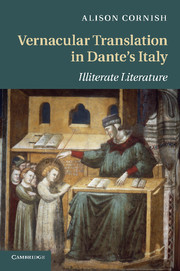Book contents
- Frontmatter
- Contents
- Acknowledgements
- Introduction
- 1 Dressing down the muses: the anxiety of volgarizzamento
- 2 The authorship of readers
- 3 Cultural ricochet: French to Italian and back again
- 4 Translation as miracle: illiterate learning and religious translation
- 5 The treasure of the translator: Dante and Brunetto
- 6 A new life for translation: volgarizzamento after humanism
- Notes
- Bibliography
- Index
- CAMBRIDGE STUDIES IN MEDIEVAL LITERATURE
3 - Cultural ricochet: French to Italian and back again
Published online by Cambridge University Press: 04 February 2011
- Frontmatter
- Contents
- Acknowledgements
- Introduction
- 1 Dressing down the muses: the anxiety of volgarizzamento
- 2 The authorship of readers
- 3 Cultural ricochet: French to Italian and back again
- 4 Translation as miracle: illiterate learning and religious translation
- 5 The treasure of the translator: Dante and Brunetto
- 6 A new life for translation: volgarizzamento after humanism
- Notes
- Bibliography
- Index
- CAMBRIDGE STUDIES IN MEDIEVAL LITERATURE
Summary
LITERARY CONQUESTS
Benvenuto Terracini defined volgarizzamento as a kind of translation effected between peoples, rather than individuals. Translations from French, because of their narrative or informational content, like prose vernacular translations of Latin works, he called volgarizzamenti. Whereas Italian renditions of Occitan poetry he did not.
In relation to France we have an abundant literature of volgarizzamento – narrative or even clearly didactic and technical content, that is very analogous to – and sometimes is confused with – volgarizzamento from Latin … In relation to Provence, the attitude towards the vernacular is somewhat different; here we have more subtle, but in a certain sense unlimited, possibilities for transposition opened up by translation concentrated in poetic form, from poet to poet, more than from people to people. Here there is no place for volgarizzamenti.
Italians translated both from Latin and from French and, at first, much Latin through French. Italian lyric poetry begins with translations of Occitan verse. Indeed the story of Italian literature in general is often narrated as a liberation from cultural domination from over the Alps.
Translation can be seen as a poorer culture's enrichment by another more developed one; or, on the contrary, as the target language's imposition of its own forms on an adopted source. In another context, Terracini noted that whereas Karl Vossler read the German translations of Dante's Commedia as a ‘conquest by German culture’, Italians like Terracini (an exiled Italian Jew writing in Spanish from South America) might well see such translations as an expansion of their own cultural influence.
- Type
- Chapter
- Information
- Vernacular Translation in Dante's ItalyIlliterate Literature, pp. 70 - 100Publisher: Cambridge University PressPrint publication year: 2010



